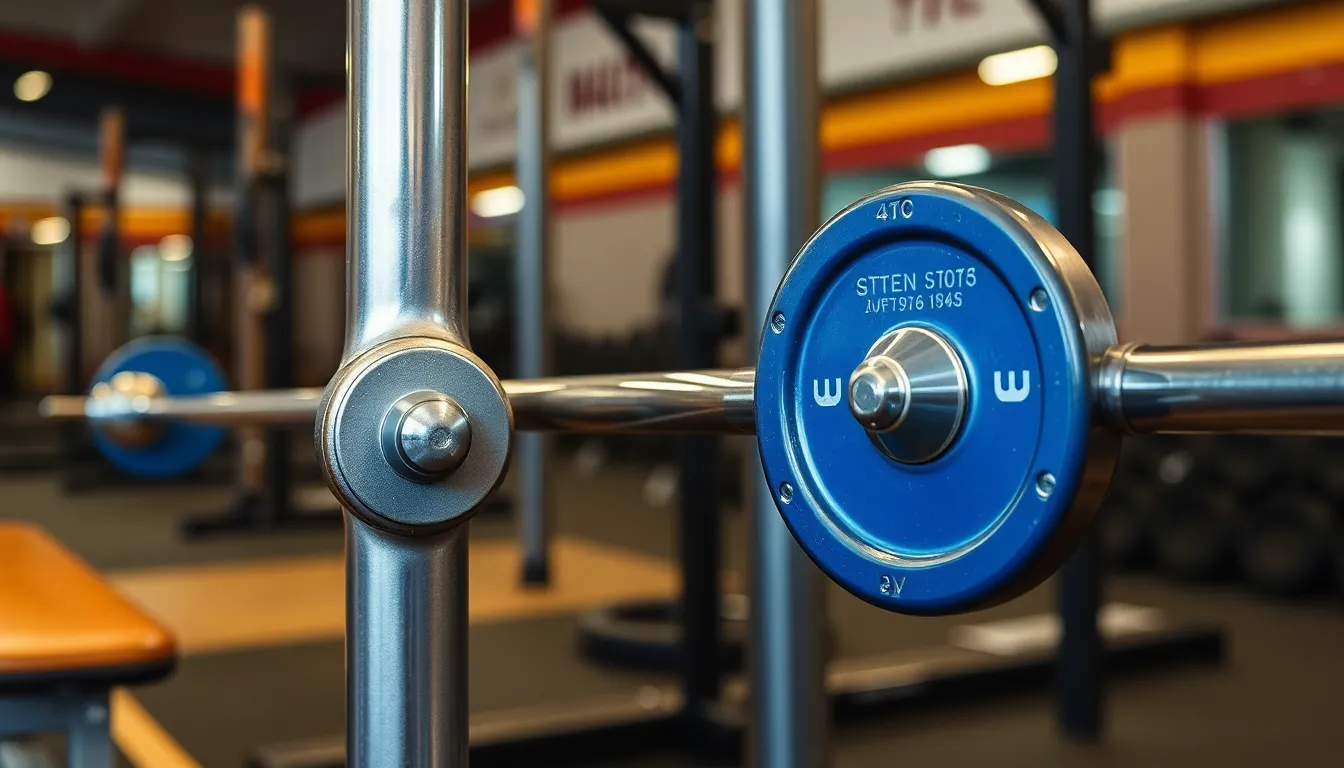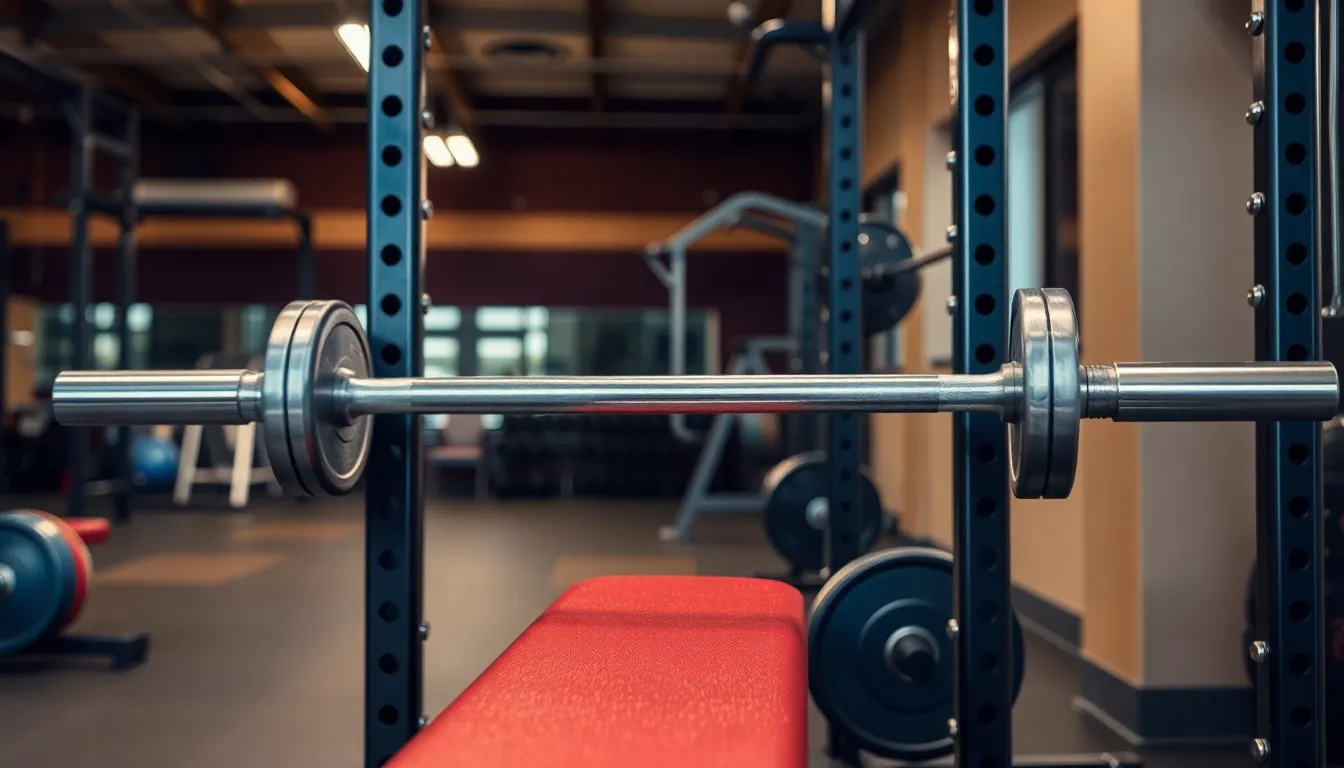Table of Contents
ToggleWhen it comes to lifting weights, the bench press bar is the unsung hero of the gym. You might think it’s just a simple piece of equipment, but its weight can leave even seasoned lifters scratching their heads. Is it a feather or a freight train? The answer might surprise you.
Understanding Bench Press Bars
The bench press bar plays a crucial role in strength training. Knowing its weight is essential for proper technique and safety.
Standard Weight of a Bench Press Bar
The standard weight of an Olympic bench press bar is 45 pounds (20.4 kg). Using this bar is common in gyms across the United States. Many lifters prefer this standard due to its wide availability. Additionally, beginner lifters can begin their training with this weight to develop proper form.
Variations in Bar Weight
Variations in bar weight exist to suit different training needs. For instance, some specialty bars weigh less than the standard 45 pounds, often coming in at 35 pounds (15.9 kg). Other options, like powerlifting bars, can weigh up to 55 pounds (24.9 kg) and offer different grip specifications. Lifters can also consider women’s bars, which typically weigh 33 pounds (15 kg). Each variation serves a specific purpose, allowing lifters to customize their workout experience.
Factors Affecting Bar Weight


Bar weight can vary due to several key factors. Understanding these elements helps lifters choose the right equipment.
Weight Material
Weight material significantly influences the bench press bar’s overall weight. Standard Olympic bars often consist of high-quality steel, providing durability and stability. Specialty bars may use different materials or coatings, leading to variations in weight. For example, a powerlifting bar could weigh 55 pounds due to its thicker steel construction. In contrast, some training bars designed for beginners might weigh less, around 35 pounds, allowing easier handling for less experienced athletes.
Length and Diameter of the Bar
Length and diameter also impact the bench press bar’s weight. Olympic bars typically measure 7 feet in length with a diameter of 28 mm. Shorter or thicker bars can weigh differently. Women’s bars are usually shorter at 6.5 feet and have a smaller diameter, weighing around 33 pounds. Additionally, some specialty bars might feature different dimensions, further altering their weight profile. Understanding these measurements assists lifters in selecting the appropriate bar for their training goals.
Choosing the Right Bench Press Bar
Selecting the appropriate bench press bar significantly impacts performance and success. It’s essential to consider the intended use and personal strength goals when making a choice.
Purpose of Use
Training objectives dictate the type of bar a lifter should select. Lifters focusing on muscle building generally benefit from standard Olympic bars weighing 45 pounds. Those emphasizing specific techniques might opt for specialty bars, which can weigh as little as 35 pounds. Individuals engaged in powerlifting find that bars weighing up to 55 pounds best suit their needs. Safety and proper form can greatly improve with the right bar selection. It’s important to match the bar’s attributes to specific training styles to optimize workouts.
Personal Strength and Goals
Individual strength levels and aspirations affect the optimal bench press bar choice. Beginners often start with a standard 45-pound bar to build foundational skills and techniques. Advanced lifters may require heavier bars or specialty bars that accommodate unique lifting techniques. Selecting a bar that aligns with personal strength aids in reaching fitness goals efficiently. Lifters should regularly assess their progress and adjust their bar selection accordingly to match their development. Setting realistic benchmarks continues to empower growth in strength training.
Common Misconceptions About Bench Press Bars
Many people mistakenly believe that all bench press bars weigh the same. Variations in weight exist based on bar type and purpose. For instance, while the standard Olympic bar weighs 45 pounds, specialty bars may weigh 35 pounds or even 55 pounds for powerlifting.
Another misconception involves the assumption that lighter bars aren’t effective for serious training. Lighter bars cater to specific needs and can significantly aid in developing proper form for beginners. Women’s bars, weighing 33 pounds, serve as great alternatives for those starting their fitness journey.
Some lifters think that the bar’s material doesn’t impact its weight. However, materials like high-quality steel used in Olympic bars influence both durability and performance. Specialty bars often utilize different materials, which can lead to noticeable weight differences.
Additionally, many overlook the effect of bar length and diameter on weight. Olympic bars typically measure 7 feet in length and have a diameter of 28 mm. In contrast, women’s bars fall short at 6.5 feet while weighing less.
Inexperience can lead to confusion about training effectiveness with different bars. Choosing the right bar is crucial for performance and safety. Failing to consider personal training goals and preferences can hinder progress.
Misunderstandings about the weight of bench press bars persist among new lifters. Gaining clarity on these points can optimize workouts. Understanding these aspects ultimately fosters a more informed and effective fitness regimen.







